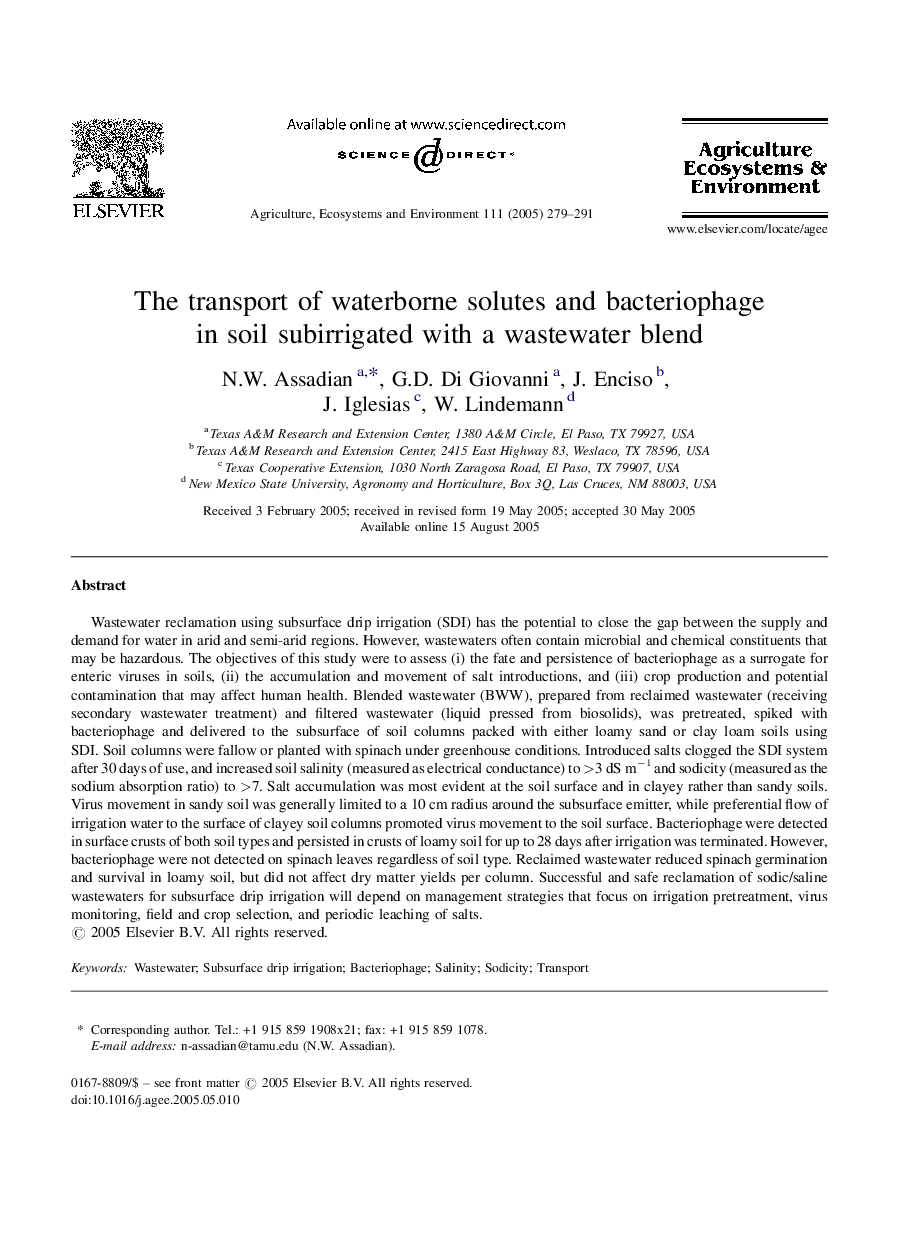| کد مقاله | کد نشریه | سال انتشار | مقاله انگلیسی | نسخه تمام متن |
|---|---|---|---|---|
| 8970736 | 1552152 | 2005 | 13 صفحه PDF | دانلود رایگان |
عنوان انگلیسی مقاله ISI
The transport of waterborne solutes and bacteriophage in soil subirrigated with a wastewater blend
دانلود مقاله + سفارش ترجمه
دانلود مقاله ISI انگلیسی
رایگان برای ایرانیان
کلمات کلیدی
موضوعات مرتبط
علوم زیستی و بیوفناوری
علوم کشاورزی و بیولوژیک
علوم زراعت و اصلاح نباتات
پیش نمایش صفحه اول مقاله

چکیده انگلیسی
Wastewater reclamation using subsurface drip irrigation (SDI) has the potential to close the gap between the supply and demand for water in arid and semi-arid regions. However, wastewaters often contain microbial and chemical constituents that may be hazardous. The objectives of this study were to assess (i) the fate and persistence of bacteriophage as a surrogate for enteric viruses in soils, (ii) the accumulation and movement of salt introductions, and (iii) crop production and potential contamination that may affect human health. Blended wastewater (BWW), prepared from reclaimed wastewater (receiving secondary wastewater treatment) and filtered wastewater (liquid pressed from biosolids), was pretreated, spiked with bacteriophage and delivered to the subsurface of soil columns packed with either loamy sand or clay loam soils using SDI. Soil columns were fallow or planted with spinach under greenhouse conditions. Introduced salts clogged the SDI system after 30 days of use, and increased soil salinity (measured as electrical conductance) to >3Â dSÂ mâ1 and sodicity (measured as the sodium absorption ratio) to >7. Salt accumulation was most evident at the soil surface and in clayey rather than sandy soils. Virus movement in sandy soil was generally limited to a 10Â cm radius around the subsurface emitter, while preferential flow of irrigation water to the surface of clayey soil columns promoted virus movement to the soil surface. Bacteriophage were detected in surface crusts of both soil types and persisted in crusts of loamy soil for up to 28 days after irrigation was terminated. However, bacteriophage were not detected on spinach leaves regardless of soil type. Reclaimed wastewater reduced spinach germination and survival in loamy soil, but did not affect dry matter yields per column. Successful and safe reclamation of sodic/saline wastewaters for subsurface drip irrigation will depend on management strategies that focus on irrigation pretreatment, virus monitoring, field and crop selection, and periodic leaching of salts.
ناشر
Database: Elsevier - ScienceDirect (ساینس دایرکت)
Journal: Agriculture, Ecosystems & Environment - Volume 111, Issues 1â4, 1 December 2005, Pages 279-291
Journal: Agriculture, Ecosystems & Environment - Volume 111, Issues 1â4, 1 December 2005, Pages 279-291
نویسندگان
N.W. Assadian, G.D. Di Giovanni, J. Enciso, J. Iglesias, W. Lindemann,